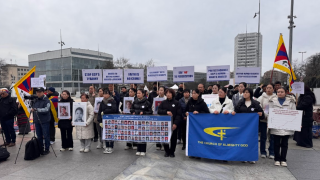In defiance of China, a delegation, led by Czech Senate President Miloš Vystrčil, Sunday arrived in Taiwan on a six-day visit — the highest-level exchange between the two countries to cement economic and cultural ties.
Observers, whom VOA spoke to, noted that the visit says a lot about China’s failing ‘coercive diplomacy’ in the Czech Republic although it remains to be seen if other European countries will follow suit to trigger a chain effect.
The Czech Republic adheres to the One China policy but maintains unofficial ties with Taiwan.
“This will be a trip to honor the spirits of late Czech President Václav Havel,” Vystrčil told the 89-member delegation ahead of the trip, according to Taiwan’s Ministry of Foreign Affairs.
Formerly a playwright, Havel was first Czech president in 1993. He had served years in prison for his dissenting political views upholding civil activism, direct democracy and human rights — values that Vystrčil said China fails to share.
Values v.s. money
“My view is that if we focus on money, we will lose our values and the money, too” Vystrčil, the second-highest official in the Czech Republic, has repeatedly told media to characterize the delegation’s visit to Taipei.
Upon the delegation’s arrival, Taiwan President Tsai Ing-wen extended her warmest welcome by saying in a Facebook post that people in Taiwan “look forward to furthering cooperation in all areas” with the Czech delegation.
By contrast, China has nothing but negative words to say about the Czech delegation and its visit to Taipei.
Chinese Ministry of Foreign Affairs spokesman Zhao Lijian Thursday described the trip as a “despicable conduct.”
China’s condemnation
China’s state tabloid Global Times Sunday cited China’s embassy in Czech Republic to say that Vystrčil made the trip “based on his own political calculation,” which has constituted an interference to China’s internal affairs and a violation to the one-China principle.
China’s objection, however, failed to renovate with the general public in the Czech Republic.
“In my opinion, I think he [Vystrčil] wants to send a very strong message to China that Czech Republic is a free and democratic country and we don’t like any country, no matter it’s China or some small countries to tell us what we should do,” said Karel Picha, a Czech who has lived in Taiwan for eight years and currently runs the only Czech cuisine restaurant in Taipei.
“We don’t like any country to blackmail us by [saying], hey, if you’re gonna go to Taiwan, it will hurt you. So, it’s a very strong statement to say that everything is not only about money,” he told VOA, adding that most people in the CzechRepublic are aware of and support the visit.
China’s failing coercive diplomacy
China’s objections to the trip appeared to have backfired after the Czech Senate, in May, voted 50 to 1 in favor of Vystrčil’s diplomatic visit to Taipei.
The vote came after the sudden death of Vystrčil’s processor Jaroslav Kubera in late January, whose widow later accused China of coercing the late senator and threatening in a letter to retaliate against leading Czech companies if he were to make good on his planned visit to Taiwan.
Last Tuesday, 70 leaders from the European Parliament, U.S., Canada, and Australia issued a statement backing the Czech delegation’s visit to Taipei and denouncing Chinese pressure to scuttle the trip.
Triggering a chain reaction?
But two professors in Taipei said that they are skeptical if politicians in other European countries will follow suit to trigger a chain effect, which they say will be a bigger headache to China.
“China isn’t really intimidated by the Czech [delegation] as the Central European country is small. What worries China more is if politicians [across the Europe] will follow suit. A possible chain effect is what concerns China the most,” said Cheng Ter-hsing, deputy executive at the Soochow University’s Teaching and Research Center for Central and Eastern Europe in Taipei.
The professor said he didn’t except many of Czech’s neighboring countries to make a similar move as daring.
Like many governments in the Central and Eastern Europe, the Czech government, led by Czech President Miloš Zeman and Prime Minister Andrej Babis, still favors closer ties with China, Cheng said.
Official statistics showed that bilateral trade between China and the Czech Republic stood at nearly $30 billion in 2019, more than triple of those between Taiwan and Czech.
Highest-level diplomatic exchange
China’s relations with major European countries mainly Germany and Britian also look stable although Taiwan has now made a “diplomatic breakthrough” in the Czech Republic, said Shih Cheng-feng, a professor at National Dong Hwa University in Hualien of eastern Taiwan.
It hence remains to be seen whether the Czech delegation’s visit to Taipei amplifies the overall anti-China sentiments in Europe or just the standoff in the Czech Republic between political parties with a different stance toward China, both Shih and Cheng said.
The Czech delegation is comprised of senators, politicians, including Prague Mayor Zdeněk Hřib, business leaders from some 40 Czech companies, scientists and media.
In the upcoming days, Vystrčil, accompanied by his delegation, is slated to attend a Taiwan-Czech investment forum on Monday and give a public speech to Taiwan’s Parliament on Tuesday while making site visits in groups to several local companies in the high-tech, textile, biomedical industries.
Vystrčil and delegation members are also scheduled to meet with President Tsai on Thursday before wrapping up their last day on Friday in a forum, organized by American Institute in Taipei, to discuss shifting global supply chains.
Source: VOA



